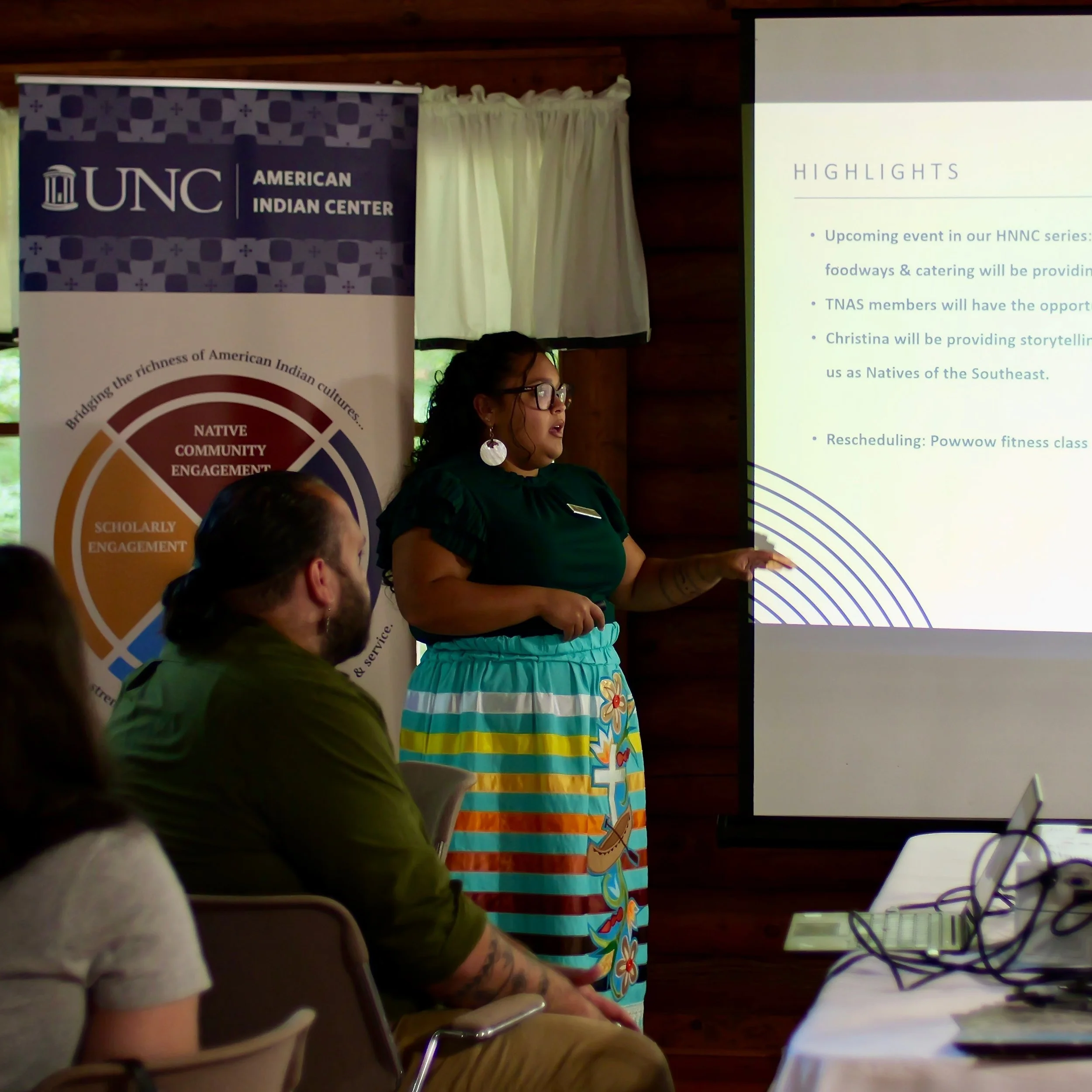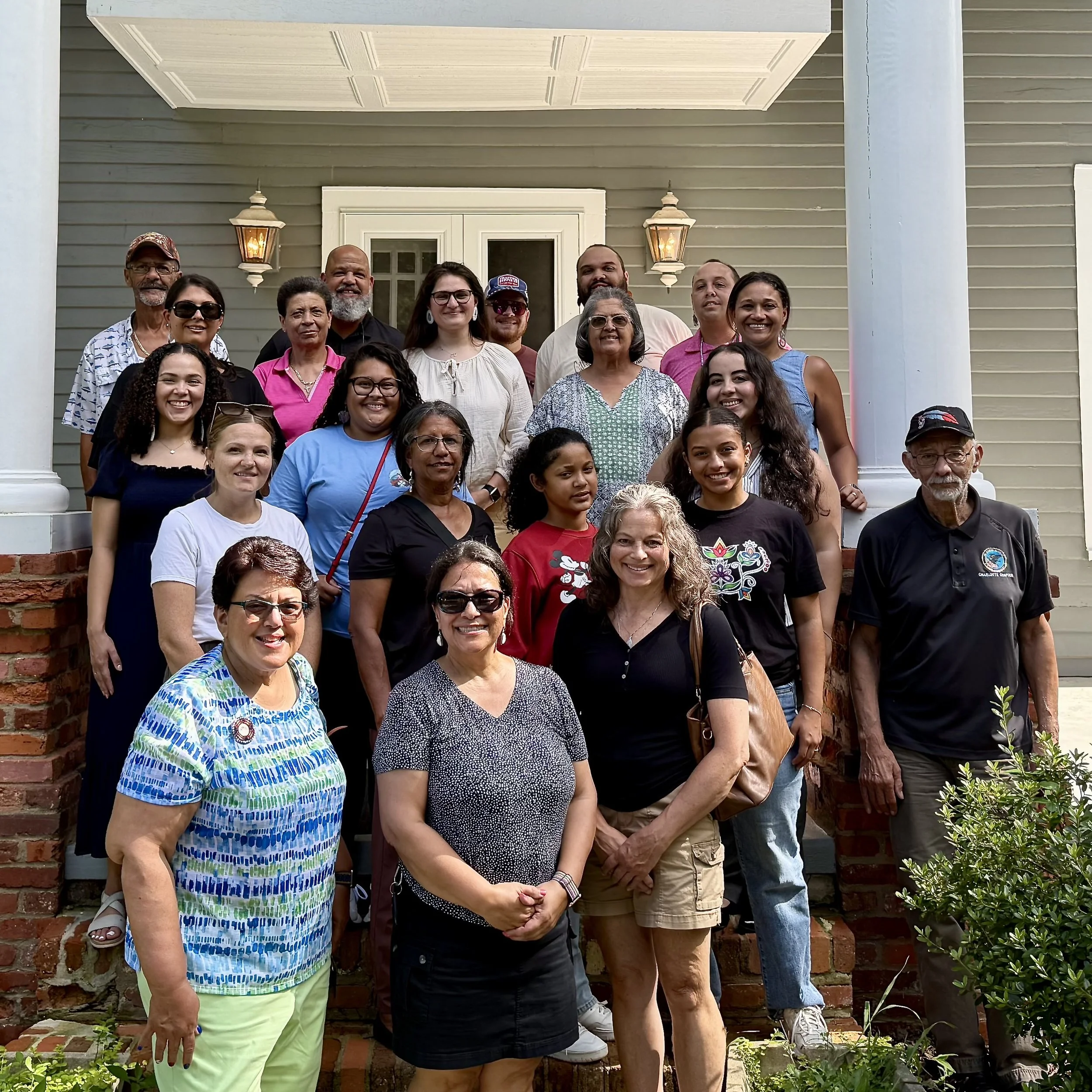Healthy Native North Carolinians - Awakening the Past and Firing the Present to Better Health
Written by Idalis Dial (Coharie)
Since I was a little girl, I had always remembered being in a community and knowing the feeling I get out of being with others that had the same values as I did. Community has always been my safe space as a Native growing up in a rural area and it’s all I ever known to be “home”. My family and fellow community members of the same tribe, participating in culture classes, our annual powwow, community meetings and events. This space for me as a little girl was comfortable and it wasn't until I became older that I realized it was medicine.
Colonialized education has made us think that the only kind of medicine is “prescribed”, ones that come in a capsule or pill form that you take to heal certain health problems. In my culture, medicine relates to everything around you, community, food, plants, cultural activities, ceremonies, anything that keeps our culture thriving. These are key ingredients to medicine that kept our ancestors alive and strong to care for one another. After a chunk of this being taken away from us, it’s depended on us in the present time to teach what has been learned of ourselves.
My grandfather has been Tribal Administrator of the Coharie Tribe for years and as a little girl I remembered spending summers with him at our tribal center. I would run up and down the hall ways and interact with the staff and elders who still till this day sit in the kitchen and sew quilts. This was when I realized that our communities are important and continuing to do the work of culture revitalization is important and I knew some day I would want to play a role in that work.
I worked in healthcare for 5 years before I came on to Triangle Native American Society as the Program Coordinator and while my time in healthcare was difficult, it was a fulfilling feeling knowing that I played a role in saving someone's life. During my time in healthcare I realized that I wanted to work in tribal communities and receive that same fulfillment through our tribal communities. To help bring the resources I knew to teach others and make them aware of how important our culture is and the importance of the work is to sustain it.
During my time as Program Coordinator I have taken on the responsibility of the Healthy Native North Carolinians (HNNC) program. The Healthy Native North Carolinians Network that is administered by the American Indian Center at UNC Chapel-Hill, facilitates sustainable community changes to support health and wellness within North Carolina’s Tribes and Urban Native Organizations by leveraging common goals and resources. I was always aware of this program because of those summers and other times spent at the tribal center with my grandfather. Over the years I was able to build relationships with fellow community members from other tribes that affiliated with this program and also played a role in getting this program started to help all Tribes and Urban Native organizations all over North Carolina.
With my background in healthcare, I was happy to take on this responsibility and use it as a chance to hopefully make other community members feel that same feeling I did as a child up until now, the medicine I feel when being in community. Bringing in our artists, feeling the calming effect of making a piece of pottery, basket weaving, sewing, beading, stringing corn necklaces, constructing corn husk dolls, or being on the land. Our Native chefs, tasting the satisfying flavors of Native plants and crops that sustained our ancestors for years. Our powwow dancers, getting physically active with dances that were shared from our brothers and sisters in neighboring tribes and re-learning dances from our own ancestors. Holistic medicine is more vital to us as Native people than any prescribed medication could ever be.
The Healthy Native North Carolinian program has given us the opportunity to take our tribes and organizations to the next level when it comes to advocating for health in our communities. It provides the funds and resources to bring visions alive and awaken the past that created us as Native people and put fire into the generations now to continue the work.
Triangle Native American Society’s HNNC project has allowed us to bring cultural workshops and Native educators in to teach our own TNAS members. A lot of our members in TNAS live away from their tribal territories, so it is vital that we make this organization a home away from home for our members through our programs. Bringing in Native educators that our members recognize brings in that sense of comfort and community.
We’ve had:
Joy Hunt (Lumbee) who is a Licensed Dietician and Nutritionist came to talk to our members about the importance of nutrition and diet as Native people.
Alicia Freeman (Waccamaw-Siouan) who is a Licensed Clinical Mental Health Counselor, to talk about bridging the gap between mental health and our cultural practices.
Christina Theodorou (Lumbee), who is a Native chef and owner of her own Native foodway catering business Atkowa, to talk about our Native foods and crops and provide a cooking demonstration for our members and non-members. She talked about the history of the tomato and different ways it was cooked and its nutritional values. Using Native owned catering business to provide healthy meals for our members at workshops and community events.
Each of these Native educators is local to the Triangle area and played a vital role in sustaining holistic medicine in our Urban Native community. It’s a joy knowing that we have these Native educators in our community and surrounding communities, they have done good work thus far and there’s still so much work to do for the health of our community.
Through the short time I have taken the responsibility of HNNC for Triangle Native American Society, it has allowed me to enhance relationships I have with fellow leaders from other Tribes and Urban Native Organizations and also form new relationships. One of the responsibilities is that grantees have to participate in a mid-year check-in, and this allows for all grantees to come to one space, this is usually held in a tribal community. During this check-in we present our own projects within our community and we get to hear about the other projects that Tribes and Urban Native Organizations are working on as well. This creates a space to learn and collaborate with others and find ways to work together. It’s a joy for myself being able to take up space at these check-ins, knowing that my younger self dreamed to one day be in this position.


